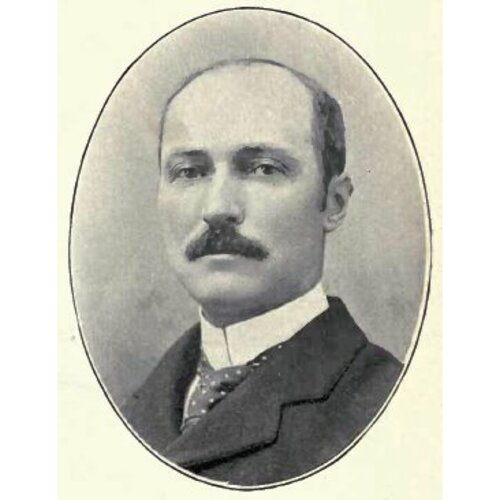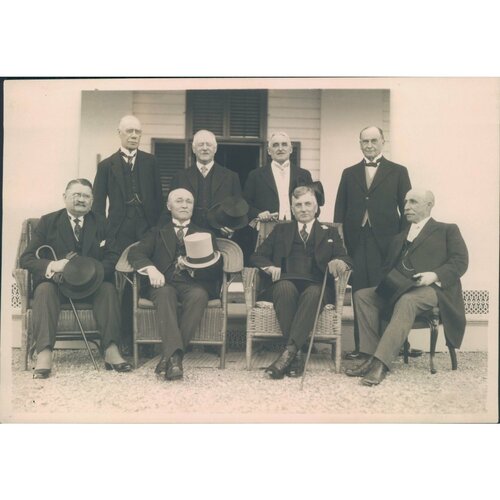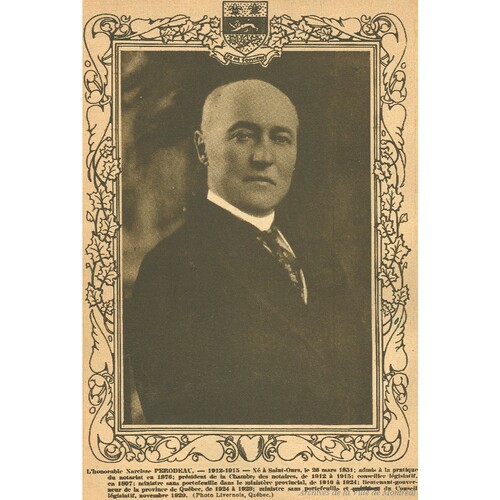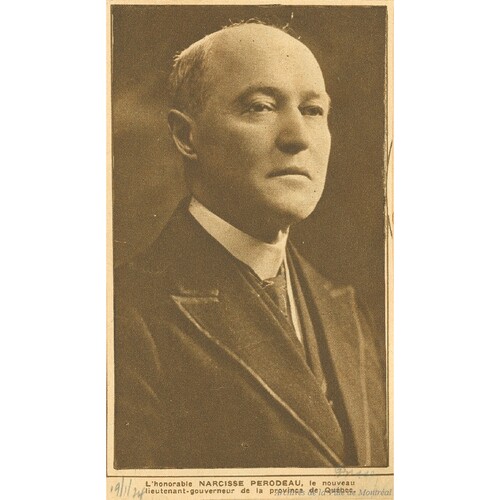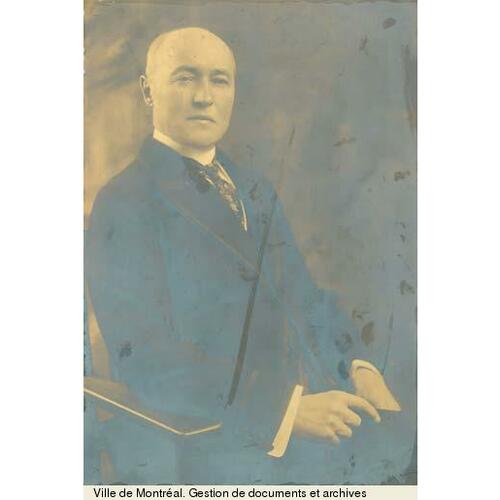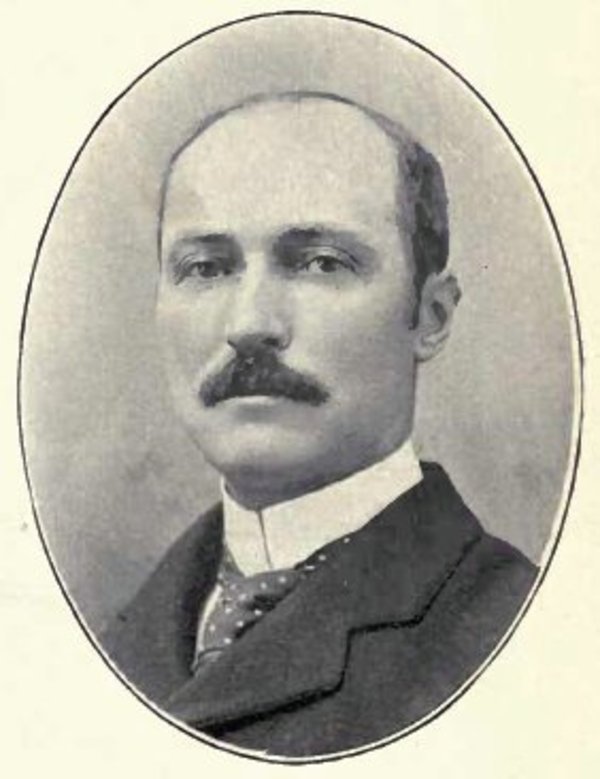
Source: Courtesy of Wikimedia Commons
PÉRODEAU, NARCISSE, notary, law professor, and politician; b. 26 March 1851 in Saint-Ours, Lower Canada, son of Paul Pérodeau, a farmer, and Modeste Arpin; m. 23 April 1883 Mary (Marie-Louise) Buckley (d. 2 Feb. 1913) in the parish of Saint-Hyacinthe-le-Confesseur, Saint-Hyacinthe, Que., and they had six children, four of whom, a daughter and three sons, survived; d. 18 Nov. 1932 in Montreal and was buried there three days later in Notre-Dame-des-Neiges cemetery.
Narcisse Pérodeau was a fifth-generation descendant of Jean-Baptiste Pérodeau, dit Lafleur, a native of Montchaude in the diocese of Saintes in Saintonge, France. Jean-Baptiste was a “corporal in the Company of M. de Repentigny,” according to the nuptial agreements he signed with Marie-Angélique Gallien, dated 22 Jan. 1731 (in which he is called Jean Perrodot).
After completing his classical studies at the Séminaire de Saint-Hyacinthe (1864–72), Pérodeau settled in Montreal in 1873 and enrolled at McGill College, where he earned a bcl in 1876. He was licensed as a notary on 17 May of that year, although his commission was dated the 18th. He immediately went into partnership with some of his colleagues to pursue his profession in Montreal. First, with notaries Joseph-Louis Coutlée and Joseph-Hilarion Jobin (for whom he had clerked), he founded the firm of Jobin, Coutlée et Pérodeau, which quickly became Jobin et Pérodeau. Then, after a couple of years of notarial practice with Charles-Marie Ducharme, he worked with George Châteauguay d’Irumberry De Salaberry in the firm of Pérodeau et De Salaberry from 1 May 1889 until 1901 or 1902. Finally, from about 1923 until his death, he would be in partnership with his son Arthur (Jules-Arthur) under the corporate name of Pérodeau et Pérodeau. In addition, he was deeply involved in the activities of his professional association. In May 1880 he became joint secretary, responsible for Montreal, of the Provincial Board of Notaries. He shared this office with the notary Jean-Baptiste Delâge, who was in charge of the secretariat for Quebec City. Pérodeau would hold this position for 32 years, until 9 July 1912, when he was elected president for a three-year term.
The first professor of notarial practice in the province had been the notary Léonard-Ovide Hétu, who had been invited by François-Maximilien Bibaud* in 1861 to provide such instruction at the first law school in Lower Canada, inaugurated on 1 May 1851 at the Collège Sainte-Marie in Montreal. In 1876 the notaries took steps to have professors of notarial studies appointed in the province’s universities. It was pointed out that law professors, who were all lawyers, tended to look down on the notarial profession and to neglect the study of questions that might be of more interest to its members. On 26 June 1880 the law faculty of McGill College announced the appointment of Lewis Alexander Hart as professor of notarial law. It was not until 1897 that the Université Laval decided to create two chairs of notarial law, one in Quebec City and the other at its Montreal campus (which would become the Université de Montréal in 1920). The 25 Aug. 1897 minutes of the law faculty of the Université Laval in Montreal refer to the establishment of a chair of studies on notarial practice, which would be filled by the notary Pérodeau. In this way, the teaching of notarial law made its official entry into that university nearly 20 years after it was founded in 1878. At the faculty council meeting on 28 April 1900, a resolution would be adopted to provide Pérodeau with tenure in this chair. That year the university awarded him an lld, as Bishop’s College would also do in 1926.
Pérodeau was professor of notarial procedure from 1898 to 1919 (when he was replaced by the notary Victor Morin) and was also responsible for teaching financial, commercial, and industrial legislation from 1914 to 1929 (lawyer Antonio Perrault* succeeded him). In December 1931 the council of the faculty of law proposed that he be named professor emeritus. Within his university, Pérodeau was also a member of the board of administrators (from 1902–3 to 1918–19) and of the academic senate (from 12 April 1920 until he stepped down on 29 Nov. 1926) as well as a delegate to the executive committee (from 12 April 1920 until he resigned on 18 Dec. 1924). In addition, he represented his institution on the Corporation de l’École Polytechnique in Montreal (from March 1918 until his resignation of 18 Dec. 1924).
While working part-time as a professor, Pérodeau also pursued a career as a Liberal politician. He would never stand for election, however. On 23 Dec. 1897 he was appointed legislative councillor for the division of Sorel by the government of Félix-Gabriel Marchand*, a notary he knew well since Marchand had been elected president of the Provincial Board of Notaries in 1894 for a three-year term. On 14 March 1910 Pérodeau was sworn in as minister without portfolio in the cabinet of Sir Lomer Gouin*, and then on 9 July 1920 in that of Louis-Alexandre Taschereau*. He became government leader in the Legislative Council on 9 Aug. 1920 as well. He left these positions to become the 14th lieutenant governor of the province of Quebec, an office he held from 10 Jan. 1924 to 10 Jan. 1929. Reappointed to the Legislative Council on 28 Nov. 1929, this time for the division of Montarville, on 5 Dec. 1929, at the age of 78, he became minister without portfolio in Taschereau’s cabinet and government leader in the Legislative Council. He would hold these offices for the rest of his life.
In May 1905 Pérodeau had introduced in the Legislative Council the first bill proposing a major reform to the law of intestacy, in order to enable the surviving spouse to share in the estate along with blood relatives. Through this legislation he wanted to assist widows whose husbands died without having provided for them, either through a marriage contract, a will, or life insurance. There was much opposition to the bill and it was not until ten years later that the Act to amend the Civil Code respecting successions was given royal assent on 5 March 1915. This statute, which would become known as the Pérodeau Law, was not only proof of the reform-minded nature of its sponsor, but also an important step in establishing equality of personal rights in Quebec, especially those of married women, who could now inherit their husbands’ estates. According to Camille Charron, in this respect the civil law in the province of Quebec was more advanced than the civil law in most foreign countries.
Finally, Pérodeau also took a keen interest in the business world, as indicated by his membership on several boards of directors. His political connections and his knowledge of commercial law were, without a doubt, reasons for companies to seek his advice. He was, among other things, a director of the Montreal Light, Heat and Power Company and the Mount Royal Assurance Company, chairman of the board of control of the Banque Provinciale du Canada, first vice-president of La Sauvegarde, and a member of the management board of the Société d’Administration Générale and the Crédit Foncier Franco-Canadien.
Narcisse Pérodeau had a long career; he died at the age of 81 years and 7 months while still holding public office in the Taschereau government. He was considered one of the most distinguished notaries of his generation, and was a professor emeritus of law, a bold legislator, and a remarkable businessman. Upon his death he was eulogized by Victor Morin as a leading figure of the notarial profession, whose career had been filled with work, integrity, and honour reflecting the motto he had adopted when he was admitted to the Provincial Board of Notaries: Labor, Probitas et Decor. The Prix Pérodeau, awarded since 1924 to a student in the faculty of law at the Université de Montréal, keeps his good name alive. Several streets in the province, notably in Montreal, Quebec City, and Saint-Ours, his birthplace, also honour the memory of this great notary.
In the Div. des arch., Univ. de Montréal, the author has consulted various documents, especially the fonds of the law faculty (E 37). The directories of the faculty for the years 1898 to 1932 were equally useful. The author has also consulted the Arch. de l’École Polytechnique de Montréal.
BANQ-CAM, CE602-S1, 23 avril 1883; CE603-S6, 30 sept. 1833, 27 mars 1851. Le Devoir, 18 nov. 1932. La Presse, 3 févr. 1913. Le Quartier latin (Montréal), 24 nov. 1932. Arch. Nationales du Québec, Inventaire des greffes des notaires du Régime français (32v. parus, Québec, 1942– ), 21 (Joseph-Charles Raimbault, 1727–1737; Guillaume Barette, 1709–1744, 1964). F.‑J. Audet et al., “Les lieutenants-gouverneurs de la province de Québec,” Cahiers des Dix, 27 (1962): 248–49. BCF, 1927: 19. Canadian album (Cochrane and Hopkins), 2: 95. Camille Charron, “Le conjoint survivant et la succession légitime en droit québécois,” Rev. de droit (Sherbrooke, Québec), 8 (1977–78): 197–336. Pierre Ciotola et Jean Hétu, La faculté de droit de l’université de Montréal et le notariat: 125 ans de formation (Montréal, 2004). “L’enseignement universitaire,” La Rev. du notariat (Lévis, Québec), 1 (1898–99): 77–90. Jean Hétu, Album souvenir, 1878–1978: centenaire de la faculté de droit de l’université de Montréal (Montréal, 1978). Frédéric Lemieux et al., L’histoire du Québec à travers ses lieutenants-gouverneurs (Sainte-Foy [Québec], 2005), 167–73. Victor Morin, “L’honorable Narcisse Pérodeau,” La Rev. du notariat, 35 (1932–33): 199–201. Que., National Assembly, “Québec dictionary of parliamentary biography, from 1764 to the present”: www.assnat.qc.ca/en/membres/notices/index.html (consulted 12 April 2018). J.‑E. Roy, Histoire du notariat au Canada depuis la fondation de la colonie jusqu’à nos jours (4v., Lévis, 1899-1902), 4. Gustave Turcotte, Le conseil législatif de Québec, 1774–1933 (Beauceville, Québec, 1933), 248, 280–81. Who’s who in Canada, 1928–29: 988.
Cite This Article
Jean Hétu, “PÉRODEAU, NARCISSE,” in Dictionary of Canadian Biography, vol. 16, University of Toronto/Université Laval, 2003–, accessed February 26, 2026, https://www.biographi.ca/en/bio/perodeau_narcisse_16E.html.
The citation above shows the format for footnotes and endnotes according to the Chicago manual of style (16th edition). Information to be used in other citation formats:
| Permalink: | https://www.biographi.ca/en/bio/perodeau_narcisse_16E.html |
| Author of Article: | Jean Hétu |
| Title of Article: | PÉRODEAU, NARCISSE |
| Publication Name: | Dictionary of Canadian Biography, vol. 16 |
| Publisher: | University of Toronto/Université Laval |
| Year of publication: | 2019 |
| Year of revision: | 2019 |
| Access Date: | February 26, 2026 |


